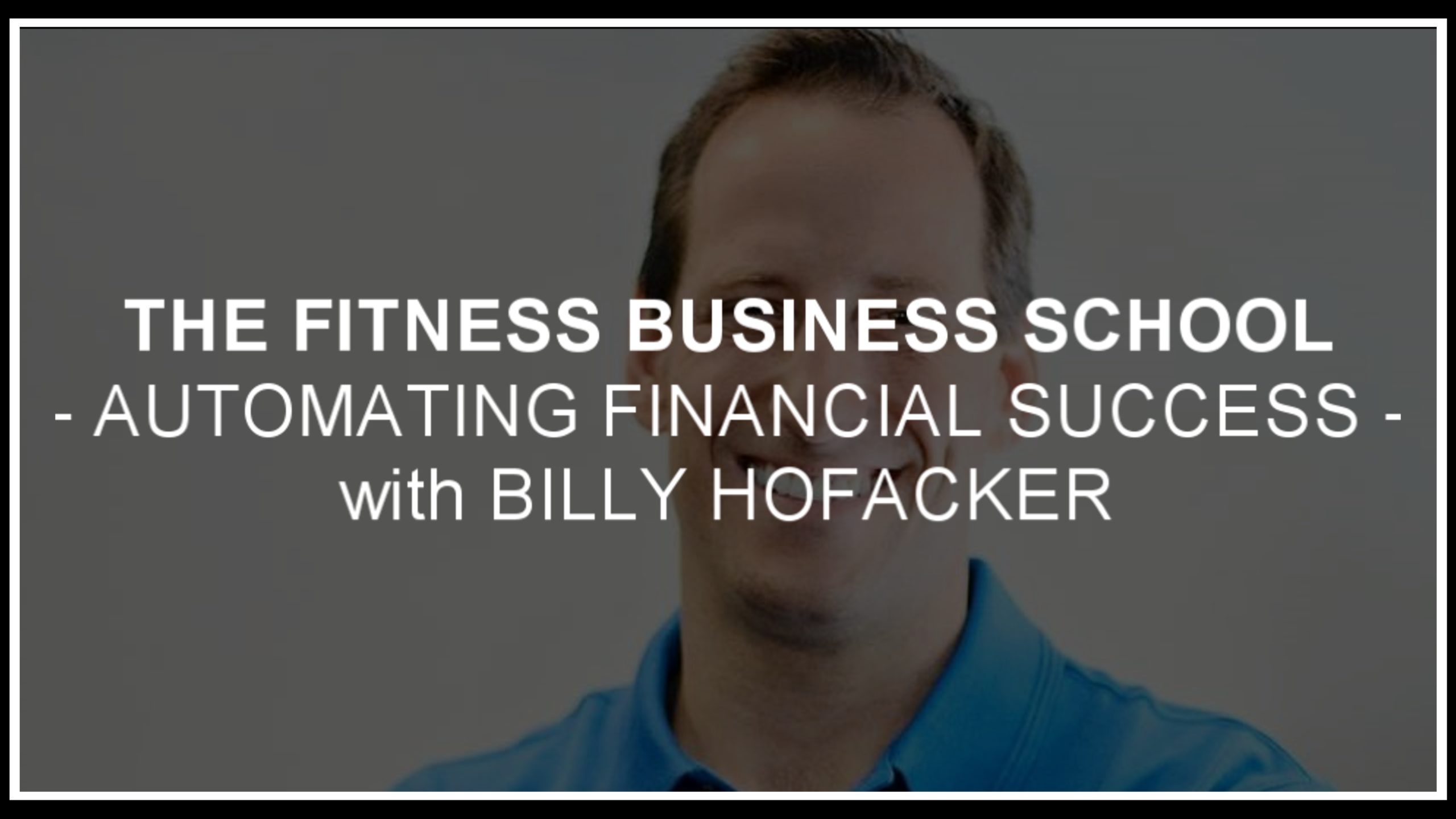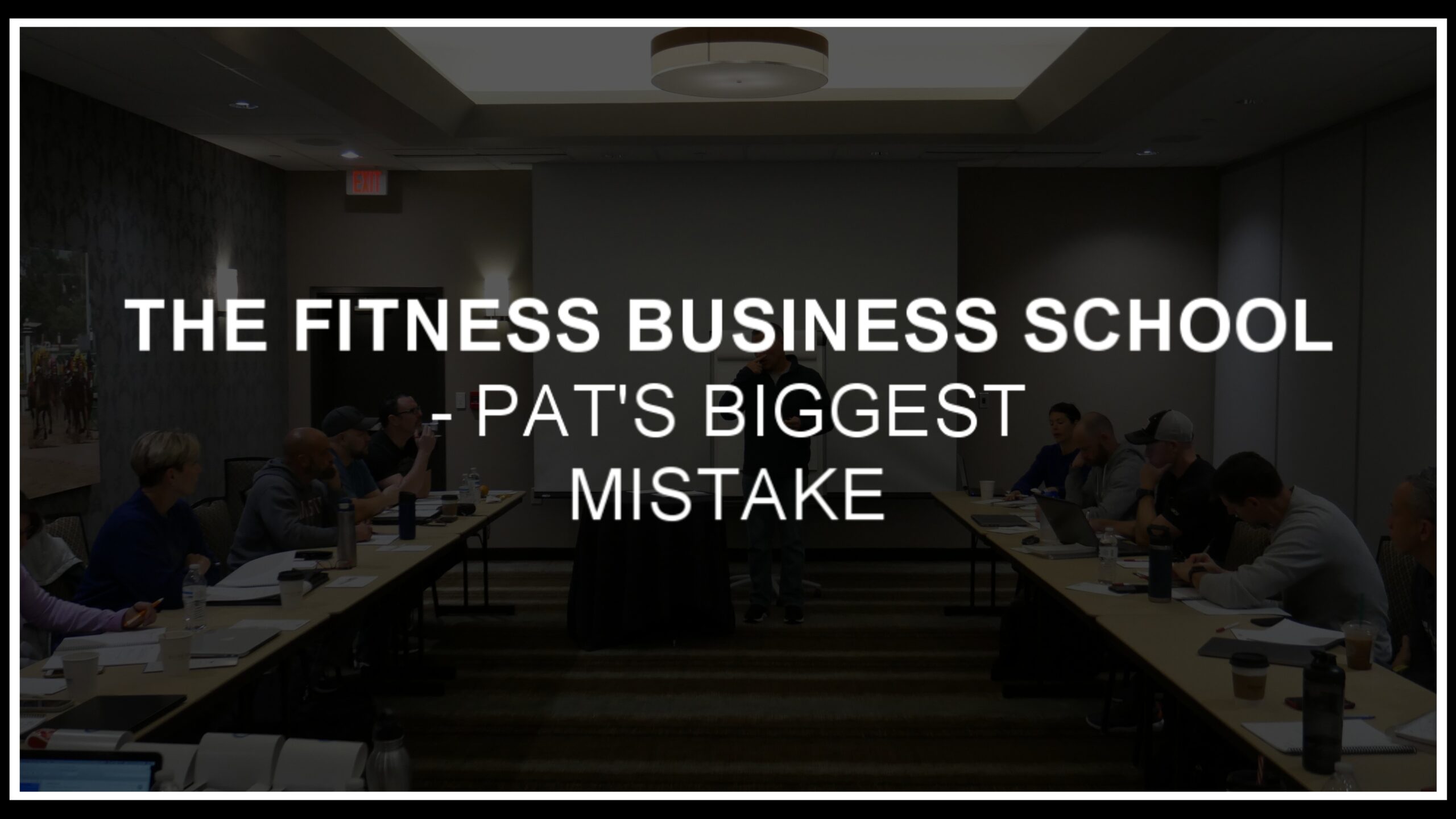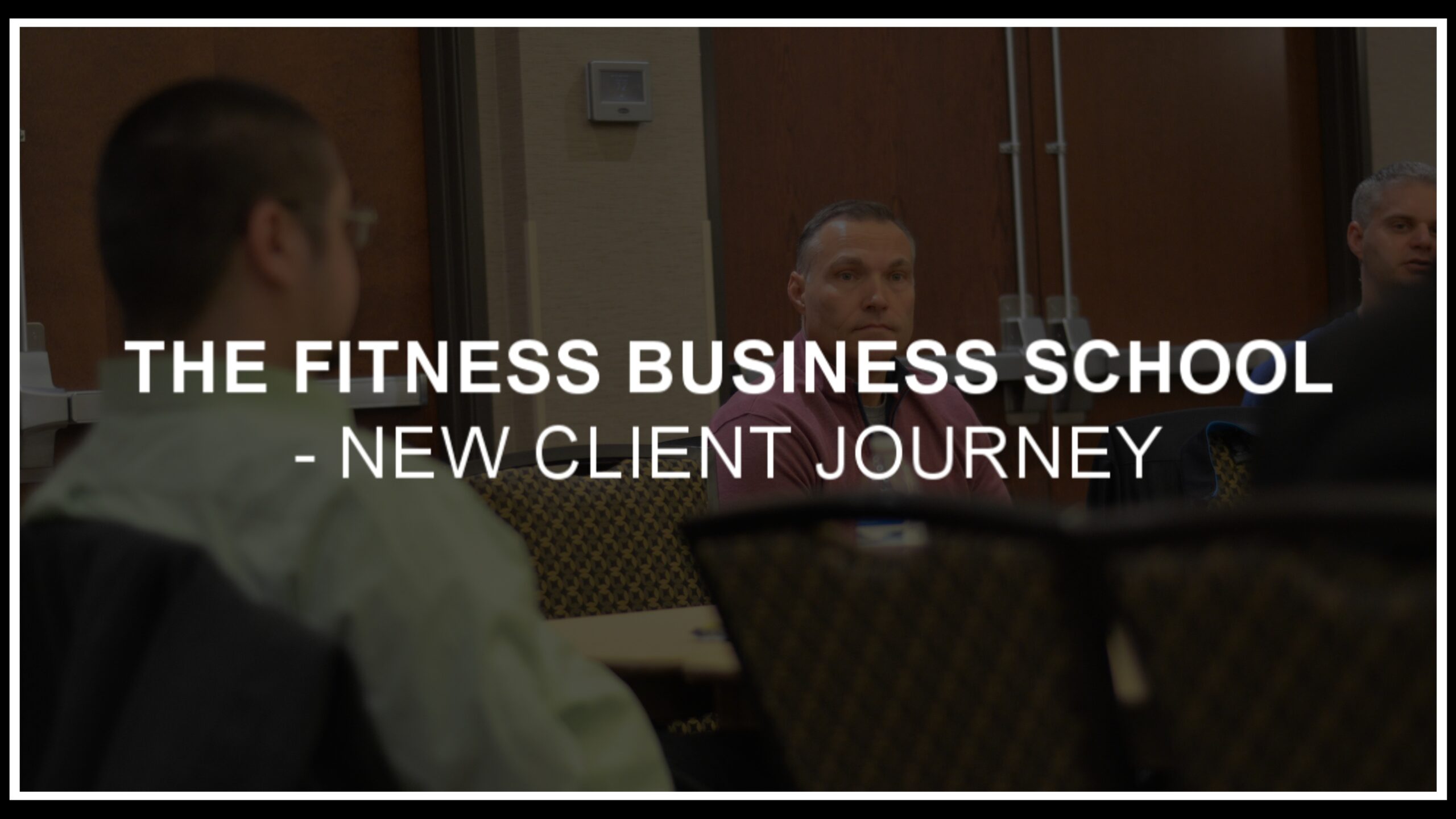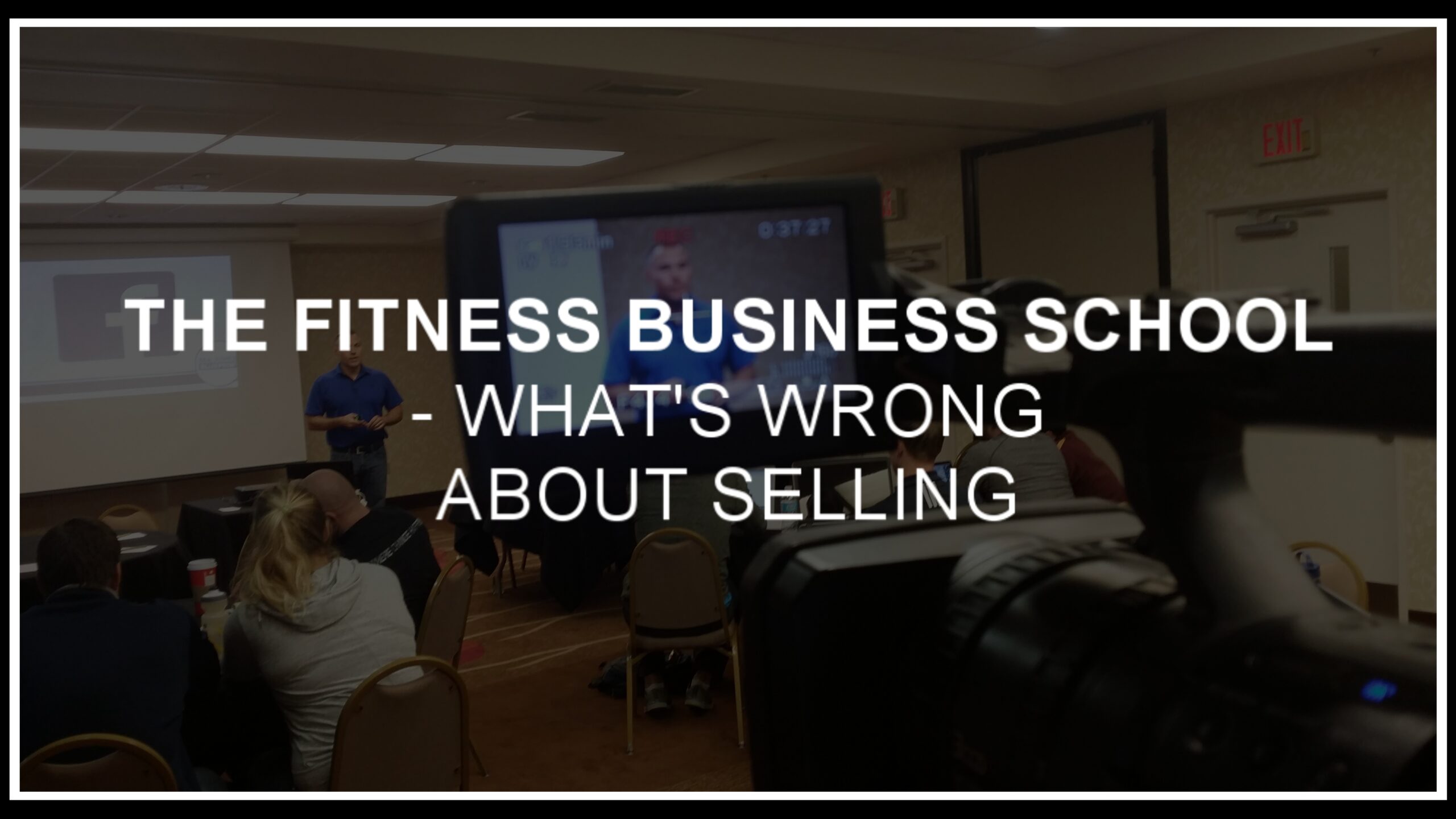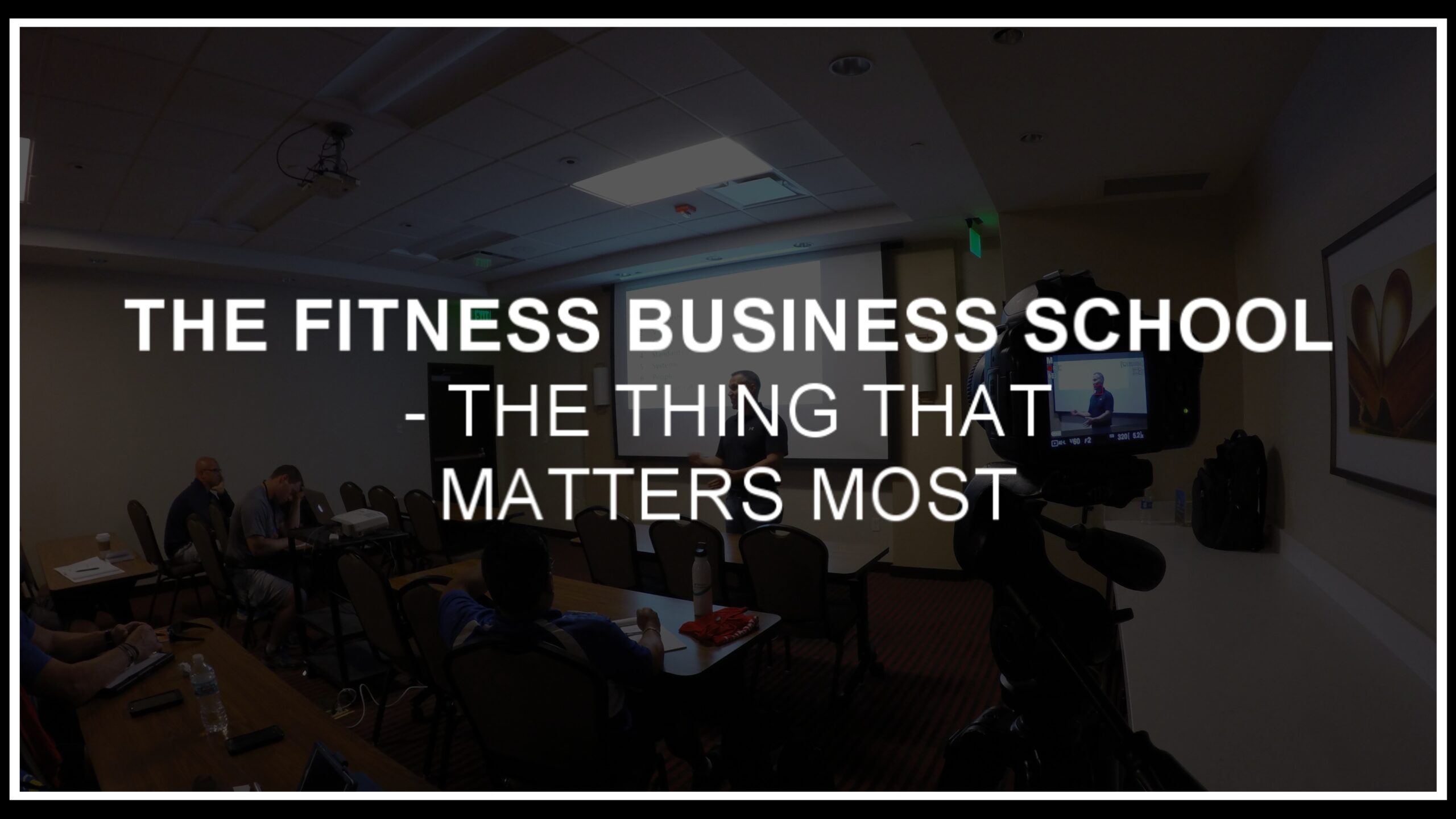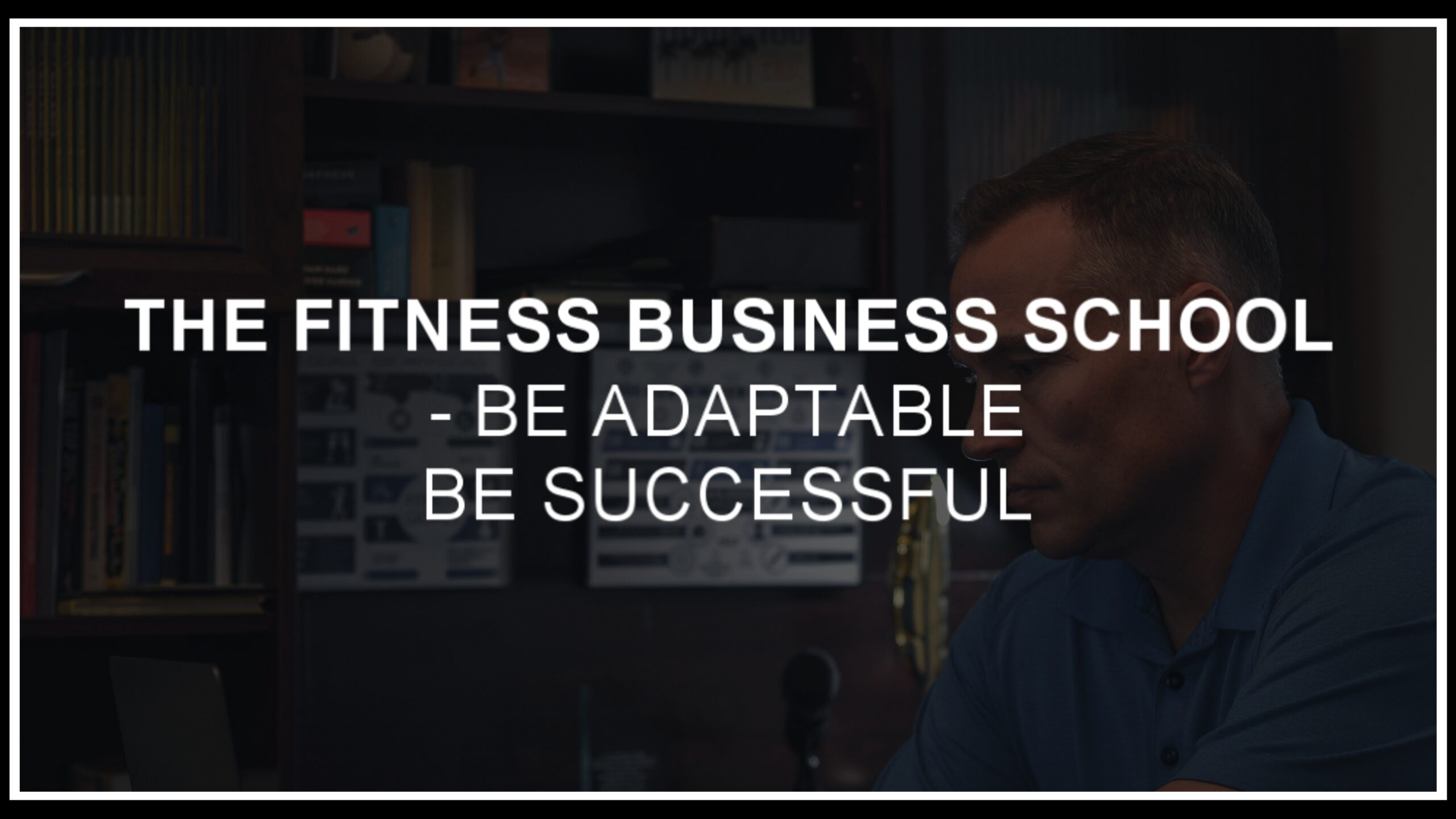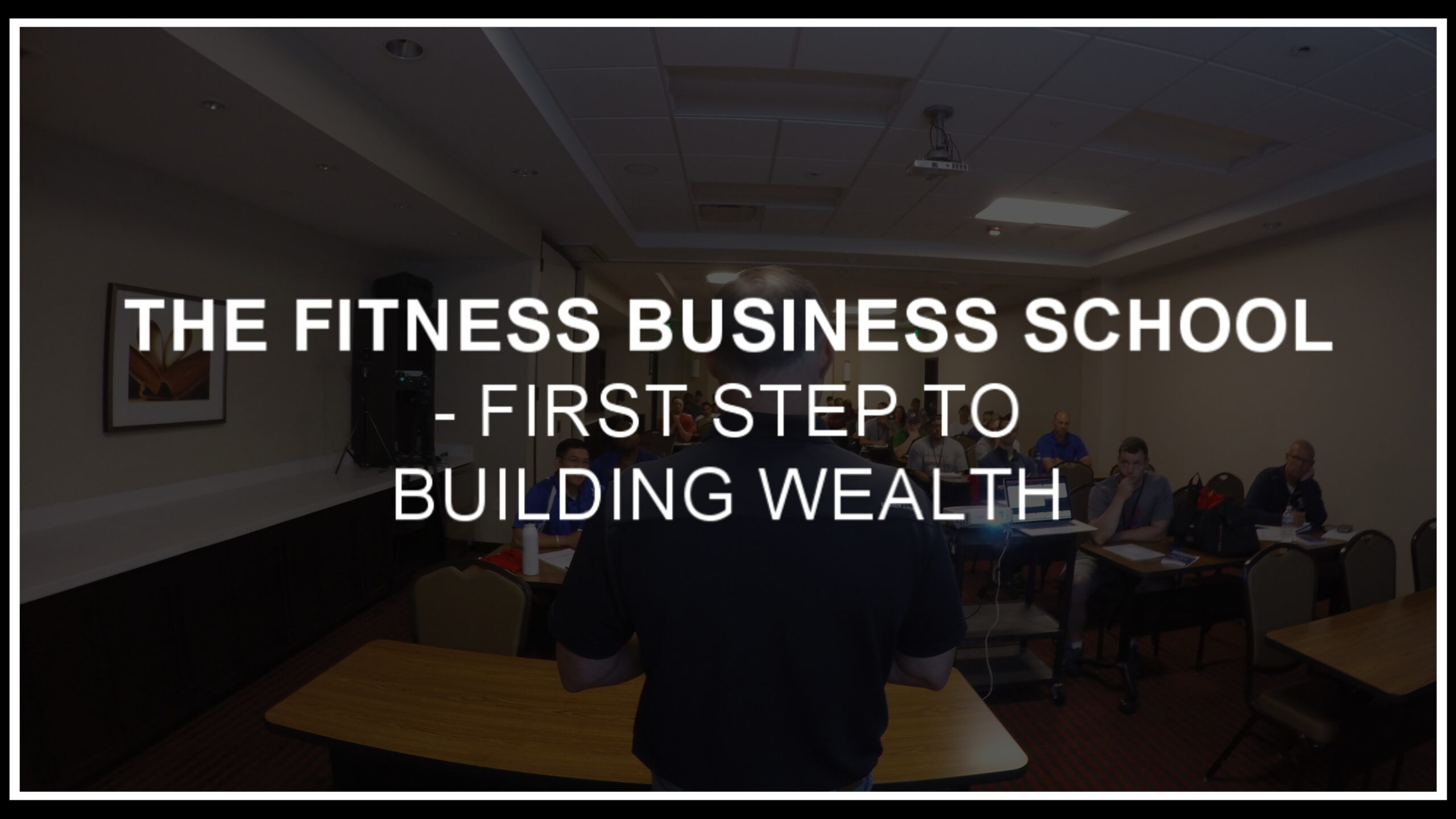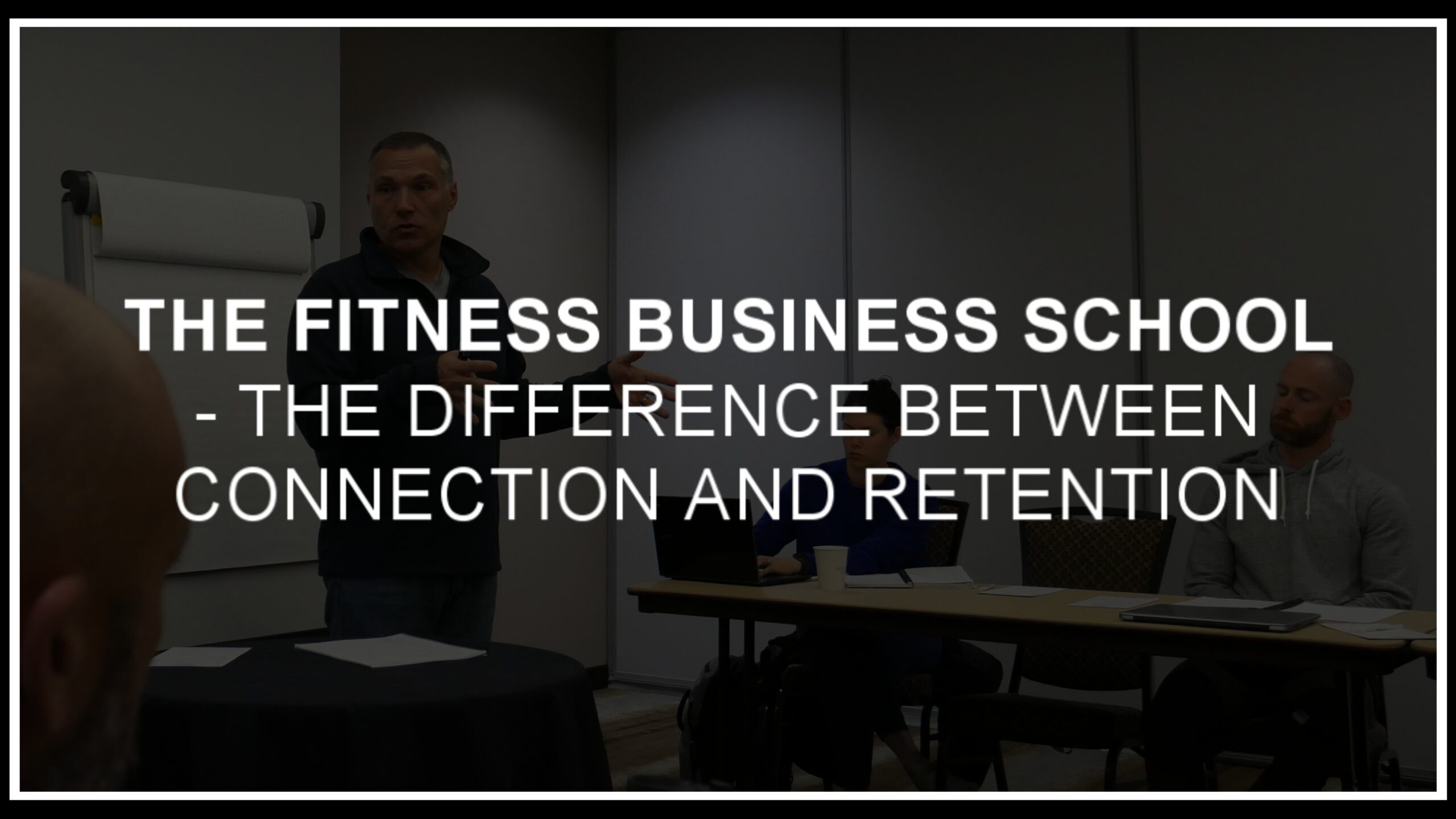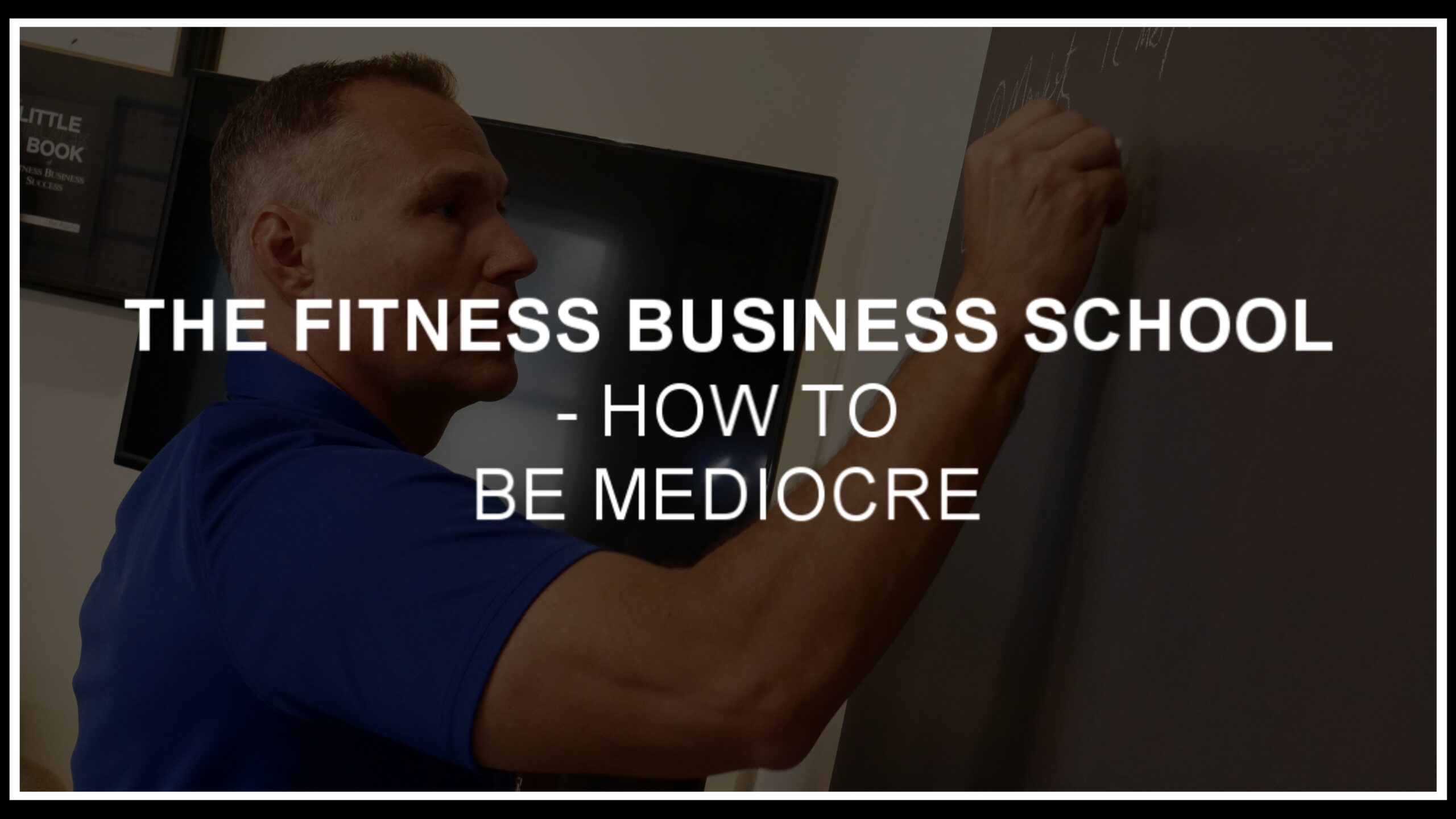Show Notes
In this episode, Pat and Billy discuss the following:
- How Pat used his baseball coaching career as a springboard for his success
- Pat’s net worth starting out was more than negative 50K including a loan go into default
- The factors that led to Pat’s financial success
- Setting specific goals
- Start with conservative savings goals and go from there
- Being a good role model for his kids
- The importance of who you’re around
- Pessimistic people are dangerous
- Reading biographies can be instrumental
- Why Pat is passionate about supporting me in helping Fit Pros with their finances
- It’s easy to rationalize financial decisions that lead to difficult positions
- How finances can be embarrassing
- How finances affect the other important areas of life
- Why it’s so important to achieve financial goals
- What’s on Pat’s bucket list
P.S. – 6-Weeks of Coaching…Free.
Get a surge of new clients and revenue over the next 6 Weeks with ZERO FEE and no obligation to continue?
If you’re a current business owner who wants to add 50K or more in annual revenue over the next 12 month, you can Test Drive our coaching program for 6 Weeks with no fee or even an obligation to continue as a way to demonstrate how we can help you grow your business.
No strings attached. No obligation. You get our best coaching & tools…and hopefully, you’ll love it enough that you want to keep working together.
Would you be interested in discussing?
If so, email me here with ‘interested’ in subject line and we’ll set up a chat.
Full Transcript
Hey Pat Rigsby here. And in this episode, we were doing something kind of special. I partner with my buddy Billy Hofacker, where we did a joint pod podcast that we shared through his platform. And now we’re sharing it through mine, where we talk about you know, the, the financial side of things, personal finance, and really it’s an area that I think has been underserved, underappreciated specific to our market of small business owners. And Billy’s taken the lead on helping people get a handle on their personal finances and some of their business finances so that, you know, they can have the security and opportunity that they want. That was really part of why they got into business in the first place. So we cover a lot of ground in this episode. I think you’re going to love it. I think more importantly, it’s going to be really valuable to you. So let’s get started.
Welcome to the fitness business school with Pat Rigsby, the podcast for fitness entrepreneurs who want to make more income, have greater impact, and enjoy more freedom in their ideal business. If you’d like an accelerated route to these goals, email me at [email protected] and put BGA in the subject line and I’ll get you all the details about our business growth accelerator program.
Oh, wow. Wow. Wow. Beyond excited to have Mr. Pat Rigsby on this show. Pat. Thanks. So thanks so much for being on. Well, I couldn’t be happier to be here man, leading off with, wow. Wow. Wow. First time I’ve done that. I’m excited. We’re ready. Nice. You got some good build up here. So most people are listening to you, you, you, you, you may know Pat is a good chance, you know, Pat, but I know we have listeners that are just in different circles that don’t. So Pat, you could just start off by just sharing a little bit about yourself, what you’re up to now. Yeah. you know, I’m a business coach for fitness, health, sports performance business owners have been doing that. It, at least in part of what I had done for the past 15 years in addition to owning other businesses, but right now it’s really professionally. It’s all I do. I help business owners do what I call, build their ideal business, you know, earn the income they want earn, have the impact they wanna have. Well hopefully having a lifestyle that is probably what they hope for when they started a business. So you get that that’s that’s, that’s kind of it in a nutshell these days. Nice. Pat has a really cool story as far as his evolution to how he got where he is. But just for time sake we want to kind of talk a little bit more about the financial side. So Pat, can you share a little bit about that side of your journey? Like, you know, w you know, just cause I know we’ve talked about it. Yeah. So, so my first leg of my professional life, I was a college baseball coach. In the beginning it was kind of a cobbled together job out a variety of part-time jobs at the university, which was a cool way for them to not have to give me any benefits or any of that. So, you know, I probably started my professional life, like many others do it kind of digging out of a hole, right. Student loans, not making much money. Eventually we did well enough that they created a full-time position for me. That was certainly not going to be enough to, or like raise a family on or anything like that. After about seven years of coaching college baseball, and also being the strength conditioning coach at the university teaching and kind of anything else I could do, right. I moved on for a little while in the, the sports and fitness industry and employee, just trying to understand how to do things and again, not making a whole lot of money, right. So not being able to really ever start to dig out of that hole and, you know, some of the debt, the credit card stuff, the student loan stuff, the interest compounds you know, so I, I I’m, I’m building up maybe some equity in me, but I’m financially kind of digging myself a hole and launched my first business in 2004. If we’re talking about this from like a net worth standpoint man, I, I had probably been net worth of just a little bit more than negative $50,000. And to, to make it even better. One of my student loans, I way back when they did this fun thing, where they do private student loans to where you would have like a private bank new, this or that I had out of $50,000 in student loans, I had a $900 student loan go into default because it didn’t get consolidated. So my, my credit score took a big plummet, which made a lot of things pretty challenging, like getting credit. Fortunately, I think I didn’t dwell on it too much. I just said, okay, I’m going to bootstrap my first business and got it off the ground, started paying down debt and, and re-investing in business stuff. And one business turned into two and two turned into three things just started to grow. And you know, financially it turned around pretty quick when I just kind of got blinders on and took some of that. I guess if you want to call it an investment in myself and focus and, and applied it to growing the businesses and then, you know, probably living pretty conservatively for awhile and putting myself and maybe more of a, a positive net worse situation that just you know, I think over the next, we’ll say 10 years really, really started starting to get pretty favorable. And, you know, the last five years it’s probably been like icing on the cake or maybe six years at this point. Nice. I’m just kind of doing some math and you just didn’t, you just did some for me. So from 2004, that’s only 17 years, not only seven years, but at 17 years. And it’s just, so it’s just another reminder and I say it all the time that, you know, you’re, you, you, you said you put blinders on, you started building businesses, but it still, but it still takes time. There’s there’s no there there’s, there’s no shortcut. I mean, there are definitely faster ways to get there. And I hear people taking 10 years, 15 years, 20 years just depends on a lot of different factors, but what would you say are like the you’ve even alluded to them already, but say more about what, what, what, what, what, what, what was it that caused you to see such big? Was it the, the income level? Was it the you know, Chang out of debt or, you know, what, what kind of things do you think were responsible for, for reaching the success? You know, honestly I would say that I probably wasn’t as debt averse is I know you are I was probably more what I considered bad debt averse. I, you know, I, I’m happy to use a credit card and pay it off every month, but low interest that probably never really scared me a ton. Where I think the biggest thing was for me was going from being an employee in a university setting where my income growth was pretty limited. You know, that 3% annual pay raise of budgets were good. You know, unless you go find a job elsewhere, which is largely in other people’s control, right. Moving into a situation where I could control my own income more and kind of getting addicted to it, right? Like you, you start to rack up some wins, you start to have some successes, you know, I think we’ve talked about that kind of snowball effect of paying down debt. Well, I think that I, I definitely inhered to that. It was like, okay, well, Hey, this is fun. I’m having some success with this. I’m going to work a little harder. I’m going to keep doing of what I’m doing. I’m going to keep studying and learning ways to get better at things and just gaining more ground instead of gaining a little bit of ground in a given quarter or a year, you know, okay. I’m going to do better. And, and I’m very much kind of a scoreboard guy. And so you know, setting very specific goals and whether it be income goals or paying off certain things or net worth goals, you know, I’m just really kind of push the envelope on some of that stuff for a while. Well, if you don’t mind sharing how much a two-part question, how much did you have in the student loans or any other debt at that point? And how aggressive were you? Were you like laser focused on paying it down or were you okay carrying some of it to do some other goals? The the, the student loan stuff, I think the worst it ever was was right about $48,000. I think it’s peak. I think my goal there was a to refinance it into lower interest because it was just at a higher interest rate because I’m not young and added at a time where interest rates were much higher. And then, you know, pay down pretty aggressively, but not basically like pay double every month. It wasn’t like, Hey, I need to get this to zero immediately. It was more like, okay, I need to set up a situation where I’m comfortable paying double with this, and then I need to be able to move and pay the next thing. Right. And you know, so the smaller things like paying off an initial credit card, those things that, that I think the light at the end of the tunnel was a little bit brighter. I was eager to pay those off because I was never going to get great interest rates on those long-term and, you know, and then put a little bit of money away. So I, I definitely didn’t follow the debt reduction at all cost playbook, as much as I wanted to set systems in place that allowed me to always kind of be ahead on that. Right. Like I do my best to automate everything when it comes to finances because I mean, it, it, it’s too easy to have a blind spot and miss something for a month or say, well, okay, I’ll double up next month or I’ll do more now. It’s like, man, I’m, I’m going to automate it and then make sure that I’ve got more cashflow coming in to support the next thing that I want to do. Awesome. Yes. So that’s a, that’s a good point can say more about the automation, because I think that’s a great takeaway for any listener just to automate it. And how does it look for you? Is it a as a percentage base, is it a mountain based? Is it retirement stuff? Like what kind of stuff is automated and, and and how does that look? To be honest, it’s everything that I can automate is so if I get one time invoices for things that obviously, you know, pay him, pay me to get them, but anything else that I could do is automated. And really it, I, I’m not a hundred percent sure what, with me, a lot of things, there’s not like a single trigger that, that sends me in books and right. You know, I’ve read books like David Bach stuff. I don’t matter millionaire. Rameet said he stuff like all of these people that talked about automation and for me, I kind of know my weaknesses. I was never a guy that was graded, you know, balancing my checkbook every day and that sort of thing. It’s like, okay, what am I good at? Well, I’m good at logging in and checking this and making sure that we’re moving in the right direction. I want that scoreboard. And so you know, I would set up an automation, whether it be to pay more like, like I said, double on a debt payment, or when I wanted to start putting money away for retirement or for investment funds for my kids, I would start at a very conservative amount and just sweep it out, you know, early in the month and start to operate my day-to-day lifestyle, assuming it’s gone. Right. And then once I’d get comfortable there and I feel like, you know, this isn’t a stress or a strain than it would be okay, let’s turn up what we’re sweeping over here. And you know what I mean, there were, there, there were points early on where it was like sweeping $25 a month over for a kid’s investment fund. To now, I mean, there’s more money that is swept away at the beginning of the month for savings, retirement kids, investment funds than I ever made when than I would have ever made any year. Gosh, up to probably 2014. So, so, you know, I mean, I think that it’s one of those things that if you get some momentum and you are systematic about it, you know, you, you just are probably more, at least a lot of the people that, that I would talk to. So I don’t know the entire listenership of the it, of your podcast, but, you know, I think a lot of small business, they, you know, if they’re accustomed to having a certain amount of cashflow to operate on a monthly basis and some of it is swept away, then they’ll find a way to create that additional cashflow to get back to where they were. Yeah. A hundred percent. Absolutely. Man. There’s so many things I wanna, I wanna pick out of that. One of the things that stands out is you talked about reading the books and like kind of basing it on your strengths and, and, and, and, and, and setting up that way. That seems to be it seems to be a common thread with you. You know, you’re talking, you talk about that a lot in your newsletter, and I see it in your, in your professional career and in your life, it’s such a valuable thing, and it’s not easy. In myself, I’m trying to really focus more, you know, books like the one thing and, and all these, these teachings about, you know, Hey, if you could just the domino effect that I’ve heard from you how did you, how’d you arrive at yours and any kind of any kind of tips, you know, Hey, I’m listening and I want to do the one thing that I’m, you know, uniquely gifted at and that I can make a difference add, but I don’t, I don’t know I don’t know where to start Well, so really it dates back to me being a college baseball coach. The first couple of years that I was a college baseball coach. I was the youngest head coach in the country. I mean, I got the job when I was 23, which in hindsight, it’s like terrifying that the university would give me that kind of response. Right. and you know, I, I didn’t have confidence in being kind of being me. There was a bit of that imposter syndrome, that sort of thing. Right. And, and I had a mentor that had had some success. He had helped me out a lot germinate by the name of Bob Morgan, who was the head coach at Indiana university. My best friend had played for him. He helped me out a bunch and he was a very different personality than I was. He come kind of the, his dad was a college football coach. He, he had a little bit of the Bobby Knight persona. And so I, I just tried to emulate a peanut and I’m like, man, he’s successful. He’s climbed ladder. He went from being a small college goats to a major college coach. I’m just going to try to be him. And it was like, you know, just putting on something that didn’t fit. And I did it for a couple years and we were okay, but it was 100% clear that I was never going to make the team, the program that I was coaching great, by being an imitation of him. I’m like, man, I’m going to have to just be me and do the things that I’m good at here. And I, and I kind of scrapped a lot of what we were doing and just took a completely different approach to the entire way we operated from recruiting to development, to gain strategy and kind of just bet on myself. And it worked. We ended up, you know, being nationally ranked that year. It just got better from there. And so that gave me, I think the confidence to, to understand that if I read a book or buy a course or join a coaching program or in a mastermind that I’m better off saying, okay, what can I draw from this? And knowing my strengths apply it kind of within my guard rails rather than giving up my identity and just trying to clone them. And so ever since then, that’s kind of the direction that I’ve gone where I’ve almost had this me filter that it’s like any information or input that I did, I’m running it through like, okay, that’s great. You know, who you are, how do you make this work for you? Yeah, that’s awesome. I even see that in your coaching, you know, you’re not telling people exactly what to do. You’ll give a framework or you’ll give some guidance, but then, you know, we all have our own trends and different ways that that’s going to work for us. Right. you talked about your journey, you talked about the first 10 years really seen some great headway. And then, and then, you know, you said the icing on the cake, what, what kept you going? Because it’s, it’s, it’s, it’s, it’s, it’s a journey. You know, some people are in a bad way. I know I was, what kept you going? You know, I think it’s a combination of things. I like, I think with me, like, like we’ve talked about, it’s never one thing. Right. I think that there was this sense of responsibility as a husband, as a stepfather and as a father that I felt like not only do I need to be the breadwinner and put us in a position that we can do things that we want, but, you know, kids are gonna go to college and they’re going to want to be you know, I want to be in a position where they’re not starting at a deficit with a massive student loan bill. So, so there was that there was the fear of failing, right? Like I I didn’t want to look in the mirror and say, man, I screwed this all up. Right. you know, that, that was one of the things that probably happened a lot during the time I was coaching there, winning wasn’t necessarily that fun. It was like a relief losing was excruciating. And, and, you know, I, I didn’t, I didn’t want to fail. And then, like from a business owner standpoint, I knew there were a number of people. The I had been around When I was a baseball coach and they’re like, man, you’re not a business owner. You’re a coach, you know, just give this up and go back to coaching. And I didn’t want to be the person to kind of tuck my tail between my legs and say, well, I went back to this because I couldn’t cut it in this other area. And so that was motivating. And then, you know, I think in a more optimistic way, I, you know, after having some success and betting on myself with the coaching thing and starting in a different direction, I’m like, you know what, this is easier than that was, I can do this. I mean, we were, we had probably one of the 10, most poorly funded programs in the country. When I took over all the resources that, that we had would have compared poorly to all the competitors and we built it into a nationally competitive program. And it’s like, well, if I can do that, then you know what I can do this, the deck is not stacked against me in the way that it might’ve been there. I’m kind of getting start from closer to an even playing field, if not completely blank. So so some of it was just kind of the, the, the challenge, the, the newness of it now. So you mentioned, okay, well, how did you stay motivated with that? Well yeah, I would maybe hit one goal and then move the goalposts. And I, I probably learn to celebrate the goal before I moved the goalposts, something that I didn’t ever figure out as baseball coach and, you know, so you know, that, that first year that you’re making you know, a hundred thousand dollars a year, that I could never do that in a year. Well, I think you, you figure out, well, if I can do this and I haven’t hit my ceiling of my capabilities, then I should be able to do more than this. Or if I’m putting away X number of dollars, well, if I can do this and I don’t feel like I’ve reached my potential, then I can probably do more. And I think I’m that way with most things you know, there, there, there’s always a goal to do better. I think I’ve gotten past the point of more, but I’m always trying to challenge, challenge myself in finding a way to do something better and better as better as a, a fun one, because it never ends, right. Is like, there’s always a, a way that you can improve some facet of something. Yeah. Is that just a like a, like a, like an inborn trait for you? Like, Y Y Y Y Y at this point, you, you you’ve, you’ve gotten pretty far why continue to try to get better? Well, I, I think that there, there are, again, a couple of reasons. One, I want to be a good role model for, for my kids. And, you know, I don’t take that lightly, right? Like, I don’t, I don’t have any thought of them following my footsteps and doing what I do and having some sort of legacy business. But what I want to do is say, look, you know, what, personal happiness and professional success are not mutually exclusive things. I want to teach them that I want to teach them that, you know, work doesn’t have to be this eternal stressor, and then you can enjoy your work and make an impact and make a pretty good living and still spend plenty of time with the people you care about doing the things that you love. And so I want to teach that, but also I, I think that I would be very inauthentic as a coach if I’m actively coaching people and I’m not trying to get better and I’m not learning, and I’m not tying to set new goals because part of, part of this is leading from the front. Right. Like leading by example. So so I think that’s a piece of it. And then finally, like, you’re, you’re right. Like, I will be the first to admit that you know, growing up in a small town that you know, it is economically challenged to say the least, you know, I never had any, any thought of you know, earning what I might earn now or having the amount that I might have put away. Like those, just those weren’t even on the radar. Right. you weren’t born with a silver spoon. I was that I, my job growing up was working in my dad’s garage as a janitor and changing oil thing. So, I mean, it was a blessing in disguise, right. Growing up as a, you know, as a child in a household, like small business owner that actually mimics a lot of the businesses that I work with now, because never a big staff. You know, it, if you count, like when my mom was working in the office, there, some, there might be two or three people helping not counting me. So never big service business even the, the footprint, like 4,000 square foot building. So, you know, there were a lot of similarities that in hindsight, it really helped me a lot, like understand the people that I serve. But yeah, I didn’t think about any of that stuff. I didn’t think about you know, we weren’t a family like went on vacation or something and so, you know, all the, all the stuff I get to do now, I am grateful for and very appreciative of, but I also think that I’d be doing a disservice to myself and everybody around me, if I didn’t keep trying to improve, it’s just at this stage improvement doesn’t mean like what I’m willing to give up to improve. Like I’m not going to work 14 hours a day to improve at this point. They’re just different constraints. But yeah, I think that all of us want to keep getting better. I don’t know. I don’t care how old you are. You probably want to keep getting better. Right. I always find that interesting how, you know, you, you went from like never having a thought of earning a certain amount or having a certain amount, like to go from that to, to a different place. How important were the different people? Were you around people that you, that you saw that encouraged you? You know, we talk about you either you or we’ve talk about the five people that you spend the most time with kind of thing. How real is that? Well, so, so I’ve actually written about the whole five people thing. I don’t know that I buy into there being a really finite number on that, but I definitely think that the input, the, we have dictates a lot about our success or influences our mindset. It influences really so much of, of how we operate. But, you know, I think that the people that I surrounded myself with or was fortunate enough to be around were not negative doubting people. No, that any of them, it like originally it achieved any of the things that we’re talking about either, but they weren’t like the eternal pessimists, even which I think that’s, that’s dangerous. Right? Like I think that being around people that continually tell you, it’s not possible or show you, it’s not possible that that’s not ever going to be something that lifts us up. But I also was continually putting myself in environments where even if I wasn’t particularly close to people, right. Like I might be in a mastermind group and I might not be best buddies with some of the other members, but I could see that certain things were possible that maybe I hadn’t thought about. Yeah. I attended events. I, I remember going to my first business focused conference. I mean, I’ve been going to the entire time. It’s like a baseball coach, business focused conferences, a Riley bootcamp in Stanford, Connecticut, way back in like 2004 or five ish. And I looked at all these people that are speaking on, on stage and the people that were talking about sales and client growth. I’m like, man, the guy up there talking about getting five clients last month, and he’s the one talking about sales. I’m like, I got five clients the day before I left. I, we don’t, maybe I need to be thinking bigger. And that, that was a real kind of revelation for me to, to not think so much in the constraints I had been thinking under like local business, Hey, hopefully I can have a couple locations, three locations, and just thought, man. I mean, if, if I take advantage of the technology and the platforms that are out there, then I can, you know, my reach is not bound by geography or drive time or whatever. And, and I think a lot of that is just held true. It’s like, you know, I’m, I’m an avid reader of biographies and always have been because what’s fun about a lot of those. If you read the good ones, you, you get to hear the tough parts of stuff too. It’s not just the highlight. And I think when you see that, man, some of these other people have done these really profound things. I’m like maybe me or earning 25 grand a year or more is not a big deal. So that’s how I, I think it’s worked for me to this point. That’s awesome. Yeah. So yeah, it was like to encourage the listeners cause I’ve been there too, the whole speaking thing, Washington speakers. And then at some point it’s like, when you know, why not you, right. Or why not me and Pat I’ll, I’ll just be you know, be clear here. You, you were that for me, I know you spoken to me with a lot of things that we’ve even done together. But of course when I first came to you and I was telling you about my thoughts about like, listen, I think I, I think I can help. I think it helped fit pros with their finances just based on my background and based on my passion. And I was really encouraged by your response because I just saw genuine belief, excitement, and that meant more to me than, you know so I guess I’ll ask you, what was it about that that not, not, not saying, not about me, but what was it about that, that you were like willing to get behind or willing to, to, to really you know, support?Well, I, you know, I think so many people in our industry, right. They they, they didn’t get into this field because they, you know, they, they lead into it with an MBA and they thought, well, Hey, I’m good. You know, build this grand gym or chain of facilities or whatever else. I mean, a few people do, but that’s not really proud. Right. you know, the people that I encountered the most are people that probably got into this, like me or you, right? Like they, he had and interest or in some cases, a passion for fitness or sports, they probably were a little more service-minded and maybe they relaxed being a financial background, a business background. They, they, they were kind of starting from a place of elementary, like knowledge, if any of some of that sort of, you know, it’s one of those things that if you don’t know, it’s really easy to look up yeah. In no time and find yourself in a hole. Right. Like, because I think a lot of people, I don’t know about you, I mean, we’ve talked about it a lot, but for me, I could rationalize all of it, like running up a credit card. It wasn’t like this malicious thing, like, Hey, I’m going out, I’m doing it. Don’t taking vacations or whatever else. It was like, man, I’m using this to go recruit because we don’t have a recruiting budget. And if I get better players and our team gets better, I’ll get a better job. And so it was easy for me to rationalize some of that. Right. you know, and I know when you were competing as a fighter, it probably was really easy to rationalize doing things because Hey, I’m investing in me. And, and I, so I think some people may have really good intentions, but they’re, they’re not savvy with a lot of this stuff. And it’s embarrassing sometimes when you get to that point, right. Like I was, I would be embarrassed to go sit down with a financial planner or an accountant early on. It’s like, you know, I mean, I’m really, you know, somewhat accomplished in some of these other areas and I’m like awful over here. And so it’s like, man, we need, we need, he did something in our industry where somebody could meet people where they were, that they weren’t going to go into this. And I feel like, okay, I just wanna, I’m burying my head in the sand and hope it all goes away. Or somebody shouldn’t talk down to me, somebody is not going to hear. And so it was just so obvious that, Hey, we got best people in this industry who are out here helping people. Well, they need people to help them. And we’re helping people in areas that feel the same way for those people, but right. Things that maybe their self-esteem is low or maybe you know, they, they, they just, you know, they, they don’t even want to address it because it’s a painful topic for them, or they don’t know the way out, or they might fall for this bad or that bad that ends up maybe setting them back even further. Well, you know, I mean, you, you can’t really pour from an empty cup, so we need people. We need people in our industry to, to help us because this stuff’s a stressor. And if you don’t dial it in, at some point, it’s going to, it may impede your ability to go help other people. It’s going to impede your ability to be a good, significant other, be a good parent. Because I mean, growing up, I remember the, the biggest areas of of strife in our house for my parents battling over money. And it was just a stressor and it’s like, well, if we can help people in small businesses kind of get past that, then it, it seemed like a must do. And with your journey and your story and your ability to, to empathize with folks, I mean, it was, it was a layup, right? It was a no brainer. Awesome. I want to repeat something you said, just so it doesn’t get lost. So we, as fitness pros, trainers, coaches, we’re helping clients in areas that they’re maybe embarrassed about and they’re just not, they’re not comfortable. They’re maybe ashamed. And and then we have, we may have that in the financial area. So it’s the same thing as something that’s hard to connect that, but I think that’s a really, really good point. And if, if, if you’re in that position Pat’s mentioned he’s been there, I’ve been there and it’s it, you’re not alone. So just know that there, there is support for you. So Pat, you’ve gotten like in a lot of ways, you’ve gotten to the other side and and you’ve also, I’ve worked with a lot of people and help them achieve great success on the business side. What, what is, what’s so good about it? What’s what kind of difference can it make as a softball, you know, softball question, but just so people can hear that. What does it, do you know, when you get this stuff in order?Peace of mind that, like, there are so many things, right? Like there, like I always talk about finances just being kind of this vehicle that provide opportunity and security, you know, when we have our, our oldest is finishing up his freshman year in college, not having to worry about which college that he might choose based on budget or you know, not having to figure out all these kind of creative sources of finding it safe. I mean, I just had a conversation with a guy coached baseball with that really liked to send his kid to a private school, but he can, if the situation he’s in and he’s a good guy, it, you know, the kid I think, would benefit from that environment. But you know, it’s, it’s something that I feel very you know, very happy to be able to be in that position because I get it. Like, there’s no way I could’ve gone to college without some of that sort of financial assistance. And so, you know, that sort of thing, having enough security, the you know, a couple of years ago, my younger son got sick and because it was not a well understood illness, insurance just really wasn’t covering much of anything. And so I didn’t want to be limited and, you know, more appropriately, we didn’t want to be limited as a family as to how we were going to treat this or whatever else and that sort of thing. It was such a big deal to, to not feel handcuffed by, Hey, I only do this because insurance will cover. So the opera opportunity and being able to choose your path the, the security to be able to take care of your family in times of need those sorts of things. I mean, that, that’s what a lot of it is, right. Like when we moved into a new house back in okay. Sober, and it’s this lovely house, how’s the, we did a few updates to and all this stuff, well, not too long after, yeah. In the house. I furnace went out and there too. We do furnaces in the house because of the way the house is built, laid out. And so I want to hear and just replace them both since they were both installed same time. And I can only, like I talked about it with Holly and even a couple of the friends. It’s like, man, if this would have happened 10, 11 years ago, I, I would have been just, my stomach would have been in knots. I would have been losing sleep over it constantly because of the amount of money that, that it caused lost. And and you know, to be able to, to address that stuff. And it not, you know, you, you’re not have to give something up on the other side, like, Oh, we’re not going to be able to put money into retirement a couple months over. We’re not going to be able to do this or that. Or I had to skip a family vacation or so, you know, I think that there, there are enough. Oh, does it come with being a business owner? There are enough challenges that come with just living general. I mean, unexpected things like the, the pandemic stuff or whatever else. This is one that is probably more in our control than many, if we can alleviate this. You know, I think it goes, goes a long way towards leaving or toward, towards living in very, you know, a very happy fulfilling life. I mean, money, I don’t think he answers everything or solves everything, but it definitely can be a problem that you can, at least in many ways, take off the table with some consistency and some persistence and some just simple sound. Decision-Making Awesome. I was actually not planning on asking this, but I was just curious now that you said that you went from not having money to having money, what did that do for you in terms of happiness? Confidence, unless it’s just what you just said. Is there anything, It it’s, it’s the stuff I just said, right. Like like not, I mean, I remember so well, like getting on Craigslist to buy, like to try to find discount, amusement park tickets, to go to our little regional amusement park tickets were tickets were $39 trying to find a way to get them for 25 bucks. Right. and all that, stuff’s fine. I mean, I I’m the same person I would have been when I was making $20,000 a year as a baseball coach. So I think that it’s a happiness thing so much as much as it’s just kind of in your mind knowing that, you know, there, there are a few of the challenges the, that I had to, to navigate when I was starting out that maybe my kids won’t have to, and that’s every parent wants their kids to be a little bit better off than they were. And we get to do some things that are shared experiences. The maybe I wouldn’t have when I was younger, but I think more importantly, it’s just, money’s not a stressor. And if we can eliminate that and spend time on the things that matter and spend time on the things that we care about, then you know, that I’m, I’m happier for that, but that’s probably Have you guys been to Disney yet? Since, since all the pandemic stuff, a couple of times yeah a couple of times, and that’s, you know, that was, that’s another thing that we, you know, that I remember that being a goal to take our oldest there when we were starting out. And it was, it felt a little bit like a pipe dream. Right. And now heck at this point, I think Alex, we counted the other day and he had been to a Disney, like a Disney vacation, whether it be like a cruise or something, I was like 42 times. Wow. And and it’s, it’s great to be able to do that. I mean, it’s, no everybody has their own kind of shared experiences. And there were a few reasons why that was a fun kind of shared family experience, but it’s just something that, you know, I know our boys really look forward to and it’s something that even though they’re almost 10 years different in age, they are great time in their own way there. And yeah, I don’t think we’d be able to do this sort of thing under different financial circumstance. That’s awesome. All right, Pat, as we start to wrap up, I just want to share, I had a, had a great time having this conversation before I’m going to do some rapid fire questions. Is there anything else you’d want to just mention first that you want to talk about or bring up? Yeah, just so it doesn’t get lost at the end. I mean, you touched on this before, but you know, this is not kind of a, you know, I, and I don’t want to be overly dramatic about it, but you know, being in debt or struggling financially is not a death sentence in this situation. Right. Like, but I get it. Like, I didn’t want to go have somebody kind of look down their nose at me and judge me or whatever. I was talking to a financial planner, an accountant long time ago, just and that’s part of why this is so cool, what you are doing. You are solving a problem that you experienced and you’re helping other people solve that problem. And you’re doing it with the empathy because you’ve been there. So there’s no judgment. There’s no you know, there, there’s no kind of hierarchy of, Hey, I’m better than you because this or that, it’s on, I’m ready to get down here in the weeds with you and help you get to the place the, that you want to be. And that you’re fully capable of being So cool. Yeah. I went from like, we all do. I went from zero to zero knowledge, less than zero money. So yeah, if I can do it and anybody can so here’s the, the rapid fire questions. The first up is what’s a mistake that you’ve made that you can share that we can benefit from financial or otherwise. They’re, they’re countless, right. But the first one that comes to mind is doing too many things. And so in turn not doing them well enough instead of on fewer things and doing them better. Awesome. That’s such a good point. Second one is either number one or one of your favorite books. I think you’ve read a couple of books before a financial or otherwise, or both. How about one of each? So otherwise I will tell you the, the, the, the book that kind of triggered my interest in marketing, or maybe help clarify my interest in marketing was a book by a gentleman named Roy H. Williams called the wizard of ads. And I had bought marketing books in the past and they all felt very textbookish to me, it was probably like somebody getting into the finance stuff and it being a little overwhelming, daunting, that sort of thing. And it, it just, it was easy to read. It was written in kind of punchy little essay like chapter. So probably I would say my daily email took, took a a bit of influence from that, just seeing how so readable for me and easy to digest. So I wanted to be able to do some of the same from a finance standpoint, I’m going to say, I will teach you to be rich by remeet SETI. Not because it’s anything dramatically better than some of the other things that I know that, that are great out there, but because I’ve talked about automation and kind of streamlining things and simplifying things, because that was a need for my personality. I think that book goes into teaching that stuff very, very effectively. Awesome. Yeah. I enjoyed that book also. What are you reading now?A book called absolute value, which is you know, really how customers are influenced during this kind of information age. Awesome. And last one is what’s something that is on your bucket list or a goal that you still have. Gosh, I have a goal that I still have that’s on my bucket list. You know, as much as anything there, there are a couple, couple of bucket list items that are completely unrelated to business, right? Like there are some other travel goals that I think my family and I would like to do traveling maybe a couple international trips and, you know, another couple of tropical trips. So that would be one side of it. And then a second side of it is there there’s a a documentary I would like to do. Again, not not really related to business so much. Gentleman by the name of branch Rickey who helped bring in, I brought Jackie Robinson into major league baseball, and we’re actually recording this the day after Jackie Robinson day. So kind of appropriate, right, nice branch. Ricky’s from my hometown that I grew up playing and coaching and branch Rickey park. And I always thought that would be an interesting project that would allow me my best friend. Who’s very much a baseball guy too. And then my step son, Tyler, who is an aspiring screenwriter to collaborate on a project. So that’s something that I think would like to do something with too. That sounds awesome. Awesome, Pat, thanks so much for sharing your wisdom and for taking the time to be on the show. I know everybody is going to be better for this one, so thanks so much. And and where can people go check out your stuff that’s place. Perry’s b.com is probably the best place, right? My podcast is there. I know we link out to all sorts of fun resources and plenty of free stuff to help people go from where they are to where they want to be. Awesome, Pat. Thanks again, man. All right. Talk to you soon.
Thanks for listening to this episode of The Fitness Business School. And before you go, I have a quick announcement. When I first connect with a fitness business owner, they almost always ask me, “How can I get more leads or how can I get more clients?” Well, I have an exclusive offer for you and it’s going to help you do just that. As a listener of this show, you can test drive Fitness Lead Academy for six full weeks for just a dollar. Fitness Lead Academy is a one of a kind program where you get done-for-you marketing tools and coaching to attract more qualified prospects and convert them into paying clients. Imagine having three marketing emails written for you each and every week for easy-to-deploy promotions provided to you that are proven to convert and they’re ready to use and proven ads and social media posts given to you each and every month as well. Plus you have access to three weekly live video coaching sessions to help you with everything from dialing in your brand to navigating things like building funnels and getting ads approved. You get all of this and more when you join Fitness Lead Academy. And to prove that FLA can serve you as your virtual marketing department and not only save you plenty of time, but also consistently bring you more leads and clients, you can get access to the entire coaching program for six full weeks. Again, for just $1. If it delivers for you in the way that I expect it will, you can continue on for just $199 a month. So basically, just one additional client each month and you’re ROI positive. And I’m sure that if you apply what we give you, you’re going to get more than just one additional client each month. And you’re going to likely save at least 10 hours a month to take advantage of this special offer. Just go to TestDriveFLA.com to try it out for six full weeks. If it’s not what you’re looking for, you can cancel it any time.
Just go to TestDriveFLA.com to get started.


